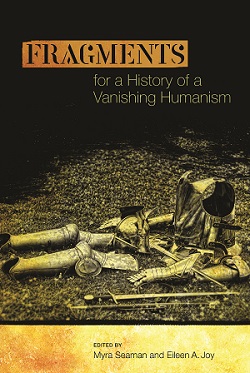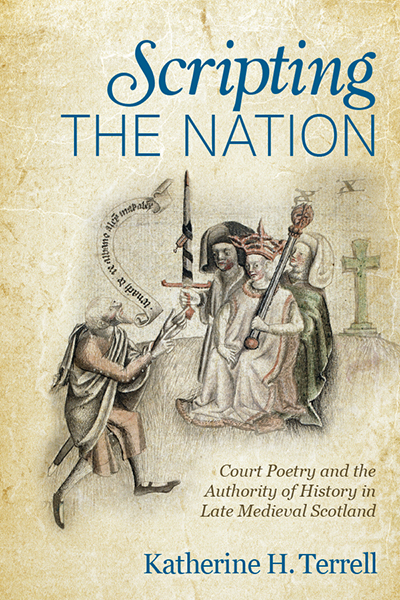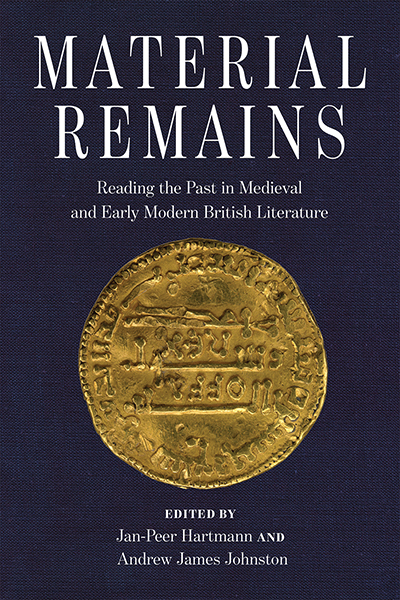“[Material Remains] represents a definitive expression of the state of current work, in medieval studies particularly, on the intersections of literary and material studies and postmodern historiography … All the essays are thought-provoking and offer new and nuanced perspectives on their topics.” —Stephen Kelly, Anglia
“William Carlos Williams wrote that there are ‘no ideas but in things’ and reading this fascinating collection of essays it is tempting to concur, for the authors … make a compelling case for the importance of reading literature in a variety of intersections with material culture.” —Rebecca Pinner, English: Journal of the English Association
“Its chronological sweep and the attention to the twelfth and thirteenth centuries make Material Remains a welcome departure from business as usual in medieval English (note: not “British”) studies. The volume will interest scholars concerned with alliterative verse, burial practices, hagiography, historiography, material culture, and issues of temporality and fictionality in early literature.” —Eric Weiskott, Speculum
“I was inspired by what this volume accomplishes, not only in its plethora of intersections between material culture and literature but also its demonstrations of how these intersections encourage us—indeed, oblige us—to breach ‘period’ barriers between early and late medieval, the Middle Ages and the Renaissance, and often enough the centuries beyond.” —Andrew Galloway, author of Medieval Literature and Culture: A Student Guide
“The range is admirably wide, from early Anglo-Saxon writing to early modern, a width that answers to the volume’s own resistance to historical alterity: these are stories that can be told only within long chronologies. The objects, as recounted in these stories of invention, are wonderfully alive, giving a good name to Thing Theory.” —James Simpson, author of Permanent Revolution: The Reformation and the Illiberal Roots of Liberalism
Medieval and early modern literature was fascinated with the material remains of the past. Scenes involving the discovery, description, circulation, or contemplation of archaeological objects can be found in texts ranging from hagiography to elegiac poetry, from historiography to romance—across regions and periods. This volume gathers voices to explore the ways in which these texts employ descriptions of objects from the past to produce aesthetic and literary responses to questions of historicity and the epistemological conditions of historical knowledge.
The contributions to Material Remains: Reading the Past in Medieval and Early Modern British Literature examine the understanding and experience of temporality as registered through the representation of found objects. From Beowulf and King Arthur to Richard III, Roger de Norton, and more, these essays reproduce the thrill of the archaeological find and generate new forms of historical understanding beyond the established narratives that reinforce modern forms of periodizing the Middle Ages.
List of Contributors
Neil Cartlidge, Roberta Frank, Lori Ann Garner, Jonathan Gil Harris, Jan-Peer Hartmann, John Hines, Naomi Howell, Andrew Hui, Andrew James Johnston, Sarah Salih, Philip Schwyzer
Jan-Peer Hartmann is a Fellow at Freie Universität Berlin.
Andrew James Johnston is Professor of Medieval and Renaissance English Literature at Freie Universität Berlin.
Contents
List of Illustrations
Acknowledgments
Introduction Reading the Past through Archaeological Objects
Andrew James Johnston and Jan-Peer Hartmann
Part I Traces
Chapter 1 Found Bodies: The Living, the Dead, and the Undead in the Broad Medieval Present
Sarah Salih
Chapter 2 The Beaker in the Barrow, the Flagon with the Dragon: Accessorizing Beowulf
Roberta Frank
Chapter 3 Evidence of the Past in the Legend of the Seven Sleepers
Neil Cartlidge
Chapter 4 The Return of the King: Exhuming King Arthur and Richard III
Philip Schwyzer
Part II Entanglements
Chapter 5 Global Beowulf and the Poetics of Entanglement
Andrew James Johnston
Chapter 6 Weapons of Healing: Materiality and Oral Poetics in Old English Remedies and Medicinal Charms
Lori Ann Garner
Chapter 7 Saracens at St. Albans: The Heart-Case of Roger de Norton
Naomi Howell
Chapter 8 The Ruthwell Cross and the Riddle of Time
Jan-Peer Hartmann
Part III Spectacle and Perfomance
Chapter 9 Archaeo-Theatrics
Jonathan Gil Harris
Chapter 10 11 Ways of Looking at Renaissance Ruins
Andrew Hui
Chapter 11 But men seyn, “What may ever laste?”: Chaucer’s House of Fame as a Medieval Museum
John Hines
Bibliography
List of Contributors
Index
Related Titles:

Chaucer on Screen
Absence, Presence, and Adapting the Canterbury Tales
Edited by Kathleen Coyne Kelly and Tison Pugh

Scripting the Nation
Court Poetry and the Authority of History in Late Medieval Scotland
Katherine H. Terrell


